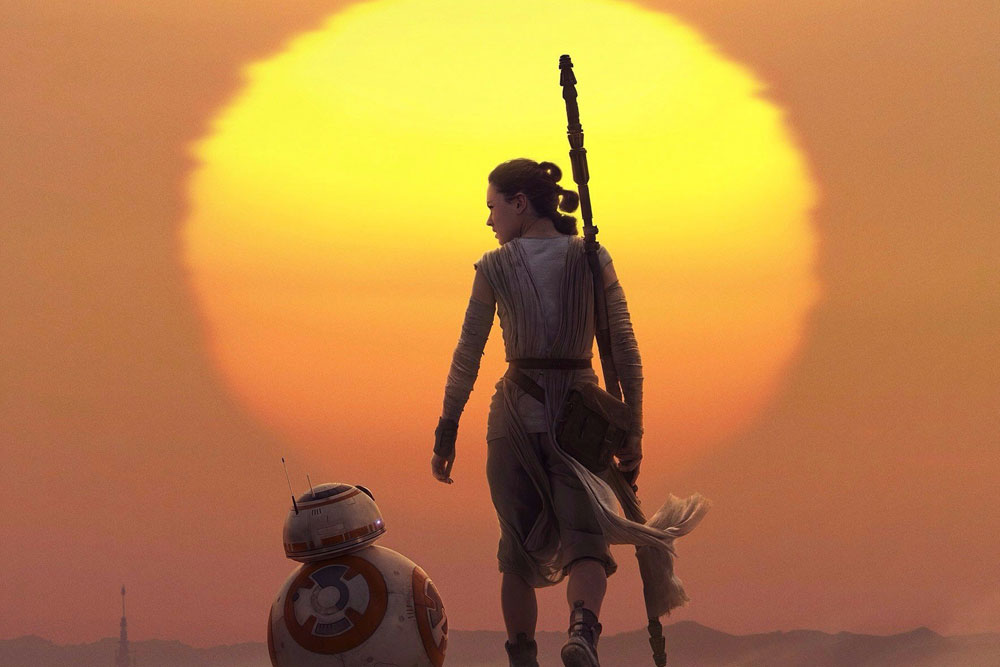Web Exclusive
Star Wars: The Last Jedi Movie Review
It is a dull movie that lumbers along for almost three hours, to tell us about yet another stage in the never ending clash between the liberals and the fascists
 Ajit Duara
Ajit Duara
 Ajit Duara
15 Dec, 2017
Ajit Duara
15 Dec, 2017
Star Wars was never a cinematic breakthrough, but it was breathtakingly new when it came out in 1977, followed by two equally fresh sequels in the early 1980s. Today, it seems so undignified when, after 40 years, and the coming of age of a couple of generations, the charming ingredients of the originals are brought out in avatars that look overworked, and seem hideously oversold, not just by publicists, but by the mainstream media.
‘Star Wars: The Last Jedi’ is a dull movie that lumbers along for almost three hours, to tell us about yet another stage in the never ending clash between liberals and fascists; between the ‘Resistance’ and the ‘First Order’. The analogy of a fictional galaxy, where two communities of humans, aliens and humanoids, along with their droids, live on planets and starships, separated starkly by their respective styles of political and military functioning, continues to evolve. But only in terms of the advance of weapon technology and the sheer physical ugliness of the leaders of the ‘First Order’. When the first three films were made, the US was in a cold war with the Soviet Union, and Hollywood viewed the nation they inhabited as akin to the good and democratic guys in the Galaxy. The Russians had an autocratic system, led by an unquestioned supreme leader, but they had some awesome nukes and missiles.
The ‘Supreme Leader’ here, in ’The Last Jedi’, Snoke (Andy Serkis), looks like a rapidly deteriorating mummy from an Egyptian tomb, one that has been exposed to extreme humidity in a Kolkata museum. His face is practically falling apart. General Hux (Domhnall Gleeson) former head of the Starkiller Base of ‘The First Order’, is a pompous idiot mocked by one of the rebels as ‘General Hugs’. It is true that the valiant fighters from the ‘Resistance’ are outmanned and outgunned by these gentlemen, but apparently the Rebels have a superior moral order on their starship, and a democratic way of functioning that allows them to overcome these challenges. Some of them are altruistic and can sacrifice their lives for their community and their way of life. A number of their senior leaders are women, and capable of great heroism, as Vice Admiral Amilyn Holdo (Laura Dern), commander of the rebel ship, demonstrates, when she gets her crew to safety, but stays on board to launch a Kamikaze attack on General Hux’s gigantic command vessel. May the force be with her, at least metaphorically.
Then there is, of course, the light side of the force and the dark side of it. At the dawn of Star Wars were Princess Leia and Luke Skywalker who lit up the sky, and who turned out to be the most iconic franchise characters in human history. Nostalgia and sentimentality reign supreme as the actors who have played them, Carrie Fisher and Mark Hamill, appear as mentors and inspirational figures to the new lightsaber generation.
But in the name of the Jedi, who stand for upholding the truth, let it be said that this plodding movie of lengthy and meaningless conversations, interspersed with bursts of CGI action that we have all seen before in a hundred Galaxy or superhero movies, enhanced by 3D or diminished by it, is a huge let down. As a result of commercialisation and repetition, the visual and sound design of a Star Wars film is now flat, uniform and patented, each one looking branded.
Furthermore, there is no unique directorial or auteurist look to the film. Even with a narrative and historical context provided, as it is with the The Last Jedi, the space/time co-ordinates are so similarly designed, you could be forgiven for occasionally mistaking the film you are watching for a Star Trek movie, or even one of the lesser known Galaxy franchises. The studios in Hollywood are now manufacturing conformity, and critical thinking on the subject doesn’t seem to have cottoned on to this yet.


More Columns
Breaking Rules with Richa Kaveree Bamzai
Banking on Experience Boria Majumdar
A Prayer to Devi Bibek Debroy